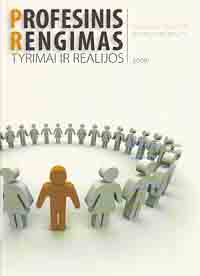Mokymasis bendradarbiaujant – sėkmingos adaptacijos profesinėje veikloje prielaida
Learning in Cooperation – a Premise for Successful Adaptation in Professional Activity
Author(s): Alicija Ramanauskaitė, Ramunė Masaitytė-ApuokienėSubject(s): Education
Published by: Vytauto Didžiojo Universitetas
Keywords: profesinė adaptacija; profesinis mokymas; mokymasis bendradarbiaujant; vocational adaptation; vocational education; learning in cooperation
Summary/Abstract: Straipsnyje, remiantis edukologiniu požiūriu į profesinę adaptaciją, analizuojamas jaunimo rengimas(-is) sėkmingai adaptacijai profesinėje aplinkoje, kuris turi prasidėti vidurinėje mokykloje bei tęstis mokantis profesinėje mokykloje. Pagrindinis dėmesys straipsnyje teikiamas profesinei mokyklai, nes ji tiesiogiai rengia asmenį būsimąjai profesijai. Mokymasis bendradarbiaujant, kaip aktyvusis mokymo(-si) metodas, padeda mokiniams įgyti daugiau ir gilesnių žinių, ugdo svarbius socialinius įgūdžius, todėl gali tapti prielaida sėkmingai profesinei adaptacijai. Straipsnyje pateikiamas autorių sudarytas mokymosi bendradarbiaujant ir sėkmingos profesinės adaptacijos elementų sąveikos modelis. The success of a vocational school graduate’s transition period from an educational institution – a professional school to labour market – a business or industrial enterprise as well as his/ her adaptation within a new professional activity directly depends on the variety and flexibility of the system of vocational education as well as the quality of interface of vocational education and labour market. When planning education at a vocational school, as well as projecting possibilities of its continuation beyond school’s range, both personal and social factors, which directly influence pupils’ training for their professional adaptation, should be estimated. Both participants of educational interaction distinguish: a pupil and a teacher. A teacher, who applies proper teaching learning methods that encourage and strengthen pupil’s motivation for responsible training for his / her professional activity as well as his / her professional adaptation, should become ‘an active agent’ in this process. The article analyses the following problematic question: can learning in cooperation become the premise for successful adaptation in professional activity? The article presents the understanding of professional adaptation as acquisition of the knowledge and abilities necessary for performance of professional functions and permanent work as well as for formation of certain psychological attitudes. The essence of this adaptation – is employees’ adjustment to new work environment, workplace, specific work conditions, work organization, and employees. The article analyses professional learning as one of the factors of training for successful professional adaptation because it develops person’s competences as well as personal characteristics necessary for his / her professional activity, correspondence of psychological attitudes to conditions and circumstances of future activity, which enables a person to identify with his / her profession through his / her present activity.
Journal: Profesinis rengimas: tyrimai ir realijos
- Issue Year: 2009
- Issue No: 18
- Page Range: 130-139
- Page Count: 10
- Language: Lithuanian

